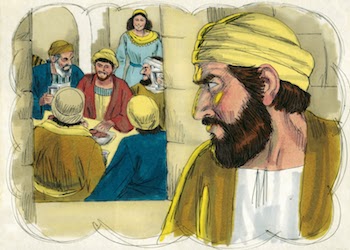A LENTEN ADVENTURE for 2024: Two Sons and A Father - Part 2, The Son That Stayed Home

A LENTEN ADVENTURE for 2024 - Friday February 23
Today, let’s continue talking about the “The Parable of the Prodigal Son,” or the name that seems better to me, “The Parable of the Amazing Father”. But today we will focus on the elder brother, the brother that did not go anywhere, the son that stayed at home.
He is almost never talked about. Most of the time the focus of the parable is on the younger son, the one that left, that squandered his life, and that one day returned home broken and repentant. Or the focus is on the father: patient, merciful, forgiving and generous. The elder son is rarely talked about. Today, let’s look at what we can learn from him …
The elder son appears in the first scene of the story, albeit in a subtle manner. He was one of two sons of a man. When the father of the family divided his properties as the younger son had requested, it appears that the elder son accepted his part just as the younger son had accepted his own share. The interesting thing is that in the Jewish culture, the elder son should have mediated between the father and younger son, defending his father, when his younger brother had asked for his inheritance so disrespectfully. But the elder son remained silent, and simply took the part of the inheritance that was his.
The elder son appears in the story again three scenes later, after the younger son has returned home, and the party and rejoicing in his honor have already begun. The elder brother came home from the field, heard music and dancing, and probably asked with surprise and curiosity what was happening. But instead of rejoicing in the news that his younger brother who had been lost for so many years had returned safe and sound, he got angry and did not want to see him or take part in the celebration in his honor. What a disgrace for the family! In the Jewish culture, it was the responsibility of the eldest son to serve the guests at the party; but this son did not want to go in to the party, nor greet the guests, much less serve them.

His father, however, going against every proper Jewish custom, humbly slipped out of the party to plead with his son to enter. So much patience on the father’s part in the face of so much disrespect on the son’s part!
At that point, the elder son began with his complaints: so many years that he had served his father – and never in disobedience – but never had the father even given him a goat to celebrate with his friends (interesting that he had no desire to celebrate with his father …) – and now that “your son” had returned, having squandered the father’s wealth with prostitutes (how did he know this? did he assume it?), the father had killed a fattened calf in his honor. A series of complaints from a monotonous life of hard but obedient service! But the father, eternally patient and tender, said to him, “You are always with me, and everything I have is yours.” While the elder son concentrated on what he did (so many years serving and never disobeying), the father thought of their relationship (“you are always with me”). While the elder son complained about never even receiving a goat, the father assured him that all of the things he had belonged to both of them (if he did not receive anything from his father, it was because he never asked him for anything).
The elder son was always comparing himself with his younger brother: he spoke of himself well (“all these years I’ve been slaving for you and never disobeyed your orders”), while he spoke very badly of his brother (“this son of yours … who has squandered your property with prostitutes”). While he, so “deserving”, never received even a goat (for all his years of obedient service), his younger brother, so “sinful”, was honored with a fattened calf (for his dissolute living). It wasn’t fair! Why such an excessive display of love for a son that was so prodigal? “What about me?”
Let’s take a moment to look at the family relationships among the three:
- the younger son, in his season of rebellion as well as upon his return home, always addressed his father as “Father”; the elder son began his complaint with “Look!”
- when speaking to the elder son, the father and the servant referred to the younger son as “your brother” and “this brother of yours”; the elder son referred to his brother as “this son of yours”.
- although the elder son never spoke to his father with respect, the father called him “son” using the Greek teknon, a word for “son” that expressed special love and affection (the same word for “son” that Mary used when they found the twelve-year-old Jesus speaking to the teachers of the law in the temple: “… Son, why have you treated us like this? …” – Luke 2:48)
We see that the elder son who lived his entire life at home with his father, had family relationships full of bitterness and resentment. He wasn’t interested in being reunited with the brother who had left. He treated those he had at home with disrespect. He expressed no appreciation, no love. Only anger, jealousy and resentment.
The problem was that the elder son could not see the “plank” in his own eye because he was so focused on the “splinter” in his younger brother’s eye. He only focused on the numerous and serious sins of his brother, but he failed to realize that his own sins were equally numerous and serious in nature.
The elder son was in his father’s house, yes – but far away from the father himself. He was present in body, but not in heart. All those years living together, but with a cold, calculating relationship full of bitterness and resentment towards his father. So much so, that he could not see how much his father loved him, how patiently and tenderly he treated him, how much he longed to have an intimate relationship with him filled with love and appreciation. The elder son was not like the younger son: he never literally left home. However, even with all those years in his father’s house, he was still far away, far from his father’s heart.

Dear friend: is it possible that you are like the elder son? You have never left your heavenly Father, but could it be that being in His presence, you are far away from his heart? Is it possible that you look at your relationship with Him in terms of faithful and obedient service, but you don’t think simply of being with Him? Could it be that your relationship with Him has grown cold and full of anger and bitterness? Is it possible that you are comparing yourself with other Christian brothers and sisters, and you feel that God the Father pours out more love and blessing on them than on you?
Dear friend: although we do not know the end of the elder brother’s story, you can follow the steps of the younger brother. Come to your senses, repent, confess your sin, rise up, and return to your heavenly Father’s heart. You do not have to go very far – you are already home. You just have to allow Him to sprinkle clean water on your sin and give you a new heart of flesh that is whole, sensitive, and full of love for Him. (Ezequiel 36:25,26)
+ REFLECTIONS